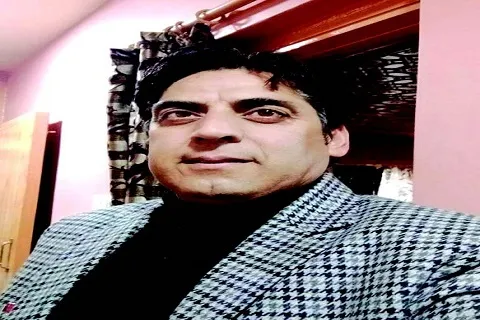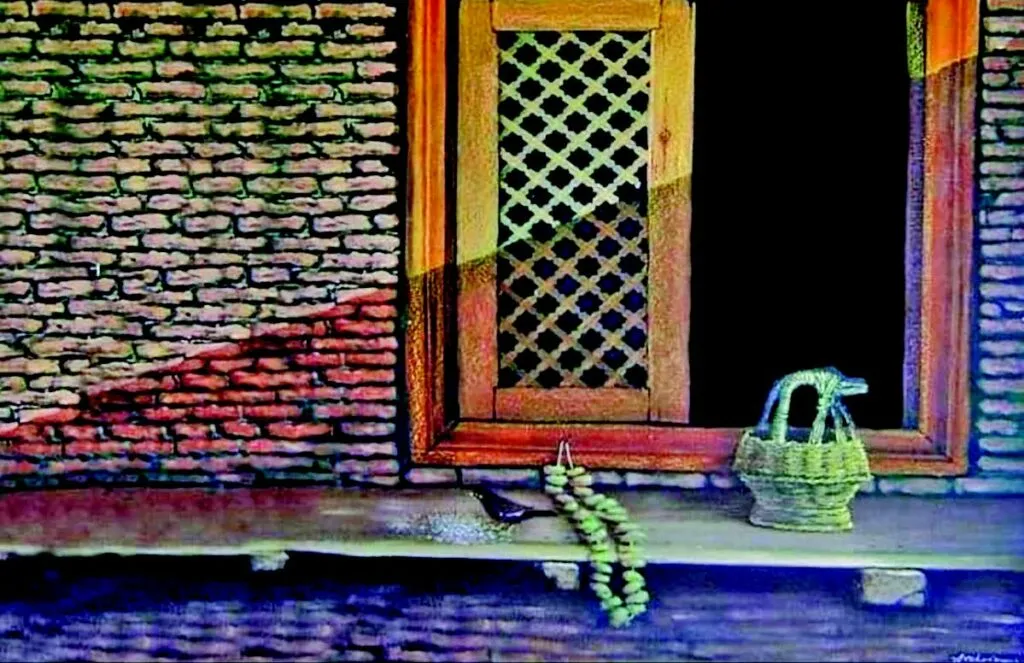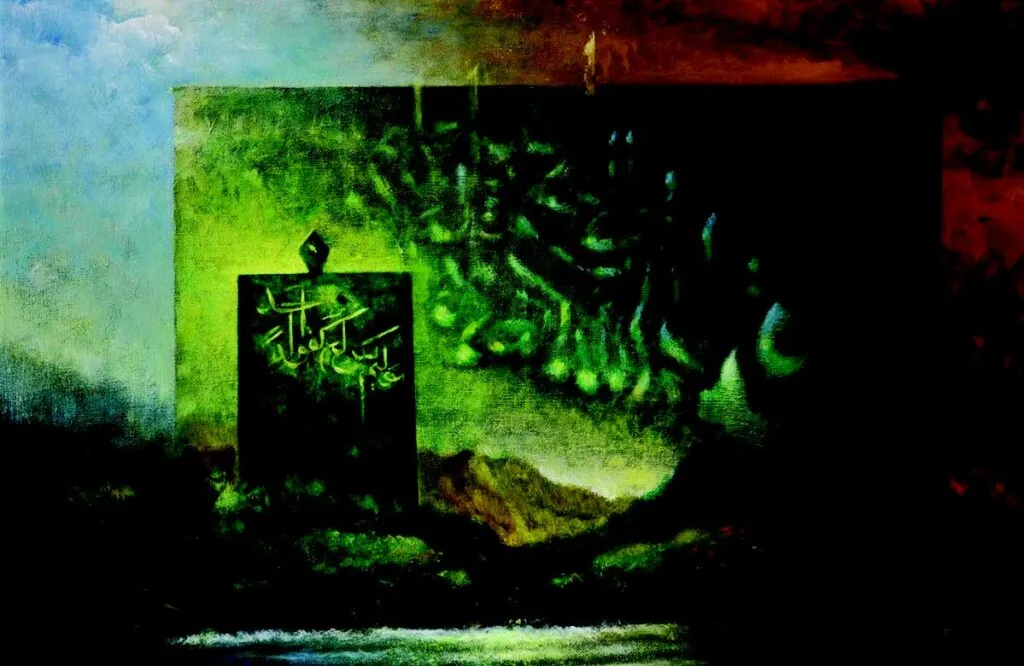Interviewer: What inspires you to paint?
Arshad Sauleh: My late father was a great artist. He was a master of traditional art of paper machie. Art is a gifted knowledge, and it is inherent, so in that sense it has been passed down to me from my father. I was just five years old when I first held a pencil and brush in my hand. This was instinctual within me. As a kid, I used to have a lot of colours and art material at my home. I had a very congenial atmosphere and it led me to paint at such a young age. I used to do a lot of sketching and used charcoal medium for my paintings. Also, I observe nature keenly and love for nature comes automatically when one has a high degree of aesthetic sensibility. Wherever I saw beauty, I used to observe it very carefully. I used to look at it repeatedly, then I used to come back home and practice painting. As far as ideas for my paintings are concerned, I believe every artist is a thinker. I spend a lot of time thinking about ideas. This is a time-consuming process and involves both mental and physical work.

Interviewer: Who is your role model when it comes to art and craft, and why?
Arshad Sauleh: My father is my first role model. I used to imitate him a lot. Later, when I went outside Kashmir for further studies, I met a lot of artists in India who became my role models. Talking about my teachers, I met M A Mehboob in 1992 when I got admission to the College of Fine Arts. Also, late Shuja Sultan, a very famous Indian painter. He has been my teacher and my role model too.
Interviewer: Appreciation is an essential element of success. Were you appreciated as a kid?
Arshad Sauleh: I was appreciated a lot. I received appreciation from my family members, especially my father. As an artist himself, he too had a great aesthetic taste, so when he used to see my work and my tendency towards fine arts, he used to appreciate me. And he gave me a lot of freedom. Whatever I do today is based on the appreciation and encouragement I received from different people in my society. My teachers, my friends and my family, all have supported and appreciated my work and this appreciation is very important for an artist.
Interviewer: : What are your most significant achievements as an artist?
Arshad Sauleh: I have participated in many group shows. I have also had many solo exhibitions, including a Grand International Exhibition in Tehran, Iran organised by Ministry of Heritage and Culture. I have worked in more than 30 national and state-level art camps, and I got a chance to meet some of India’s finest artists. As far as awards are concerned, I am incredibly grateful that my work has always been appreciated. I have received the J&K State Award three times, and I have also been awarded the Ram Mehar Malik National Award. I have received an International Award of Honour by the President of Iran.
I had also worked for the Guinness World records two years back. There is an organisation that had organised a workshop in Lal Qila, Delhi. There were many artists there, and we made nearly four thousand paintings in just two hours. The topic was brotherhood and unity.
Interviewer: How would you describe art in one word?
Arshad Sauleh: Art leads to divinity. Art is one of the greatest blessings of the Almighty. God is Himself an artist. This is one of the reasons that one of Allah’s 99 names (Asma-ul-Husna) is “Musawwir” (the Fashioner). He has created a huge painting in the form of the universe, and He has applied so many colours, numberless colours on this canvas.

Interviewer: What were the challenges that you had to face while pursuing your dreams?
Arshad Sauleh: I had to face many challenges because this work is based on hardships. Hard work leads a man to his destination, and a person who lives a luxurious life remains divested of prosperity. Without working hard, you cannot achieve anything. The person who tries to get pearls from the ocean has to dive deep down to the bottom of sea; otherwise, he builds castles in the air. So it is very important. I have to turn my nights into days, it is only then you see my paintings today.
Interviewer: When you started painting, there were not many opportunities for artists in Kashmir. Did this compel you to go outside to get some exposure?
Arshad Sauleh: Yes, I had to travel outside Kashmir. I’ve been to every part of India. I’ve worked there, learned there, and I have been inspired there. This is true that there are not enough opportunities in Kashmir though Kashmir is very beautiful and a good source of inspiration for an artist. I have created many paintings based on nature.
I have participated in various national and international art camps outside Kashmir. I’ve seen their works and techniques and have shown them my works and my techniques. So this was a give and take process. I’ve gone to so many places in India and abroad. In Iran, Iraq and other countries, I’ve seen different types of works, and I’ve got inspired.
Interviewer: Has art impacted your personal life?
Arshad Sauleh: Yes, of course. It is because the atmosphere affects an artist’s mind. My imagination, my paintings, my art, all this has affected my life too. My attitude is very different, my lifestyle is very different, my way of perceiving things is very different. I think very differently because of art, because of my paintings, because of my concepts. This happens with every artist. Art impacts their personal lives. I’m quite emotional. I’m a beauty lover, a nature lover. So, art has a great impact on my personal life.
Interviewer: Do you think art has a role to play in politics?
Arshad Sauleh: I don’t believe in that because artists are very different and have nothing to do with politics and politicians. Whatever they do, they do it by observing their surroundings. It’s an expression of observation. So everyone has to contemplate the work of art according to their own feelings. Sometimes we make a painting and people say this is regarding politics, this is regarding nature, this is regarding society, this is regarding the nation. So, it depends upon the viewer. Otherwise, art does not have any concern with politics and all that.
Interviewer: You have judged so many art competitions. Do you think artistic skills are natural, or can anyone become an artist if they have proper guidance?
Arshad Sauleh: Basically, these skills are natural. Art is a gifted knowledge. This is by birth in an artist. Sometimes, a child makes such a brilliant painting or a sketch that we all get astonished. So these are inborn skills that an artist possesses.
Interviewer: Can art and craft be taken as a full-time profession?
Arshad Sauleh: Yes, why not. If you look at Kashmir, there were thousands of craftsmen who survived on craft making. They used to feed their families and look after their children. They had taken art and craft as full- time job, for example, paper machie, wood carving, carpet weaving etc. These Kashmiri crafts are very famous all over the world. So, all those people had taken craft making as their profession and survived on this and did quite well. As far as art is concerned, there are so many freelance artists. They survive on art. They are dependent on art for their livelihood. In my opinion, art can definitely be taken as a full-time profession.

Interviewer: Would you allow your children to take art and craft as a full-fledged career?
Arshad Sauleh: First of all, I have to see their interests. If I see that they are really interested in painting and have that potential, then it doesn’t matter if I allow them or not. They will still do it, they cannot be stopped. This subject does not require permission, it is automatic for an artist. An artist can wake up in the middle of the night to draw and paint. It has been said that if anybody is trapped, he is encaged and is an artist, and he’s not allowed to paint, he will undergo a lot of pain and suffering. Psychologist Sigmund Freud said that such an artist could suffer from neurosis too. A natural artist definitely has to be given permission, just like my father, who saw that Arshad is really interested in painting and can become an artist. He encouraged me to join the College of Fine Arts. Otherwise, I have two brothers, Dr Rauf and Prof. Tanveer. They too, were observed by my father, and he helped them with their professions.
Interviewer: There’s so much unpolished talent in Kashmir. There are so many artists, so many painters. Do you have any plan to open an academy for our talented youth or any formal teaching plan?
Arshad Sauleh: I’m planning to open an art gallery. I do not have any academy or a formal class because this is not done like this. If I were a freelancer, I would establish an art studio to teach young artists. However, I still have many talented students coming to me, and I teach them some artistic skills. I try to pass on my skills to them.
Interviewer: What are the steps that can be taken to promote art in J&K?
Arshad Sauleh: First and foremost, an art gallery should be established here. Also, art should be introduced as a subject in all government and private schools so that children who can draw and paint can discover their potential.
Interviewer: What advice would you like to give to young struggling artists?
Arshad Sauleh: Artists have to work very hard. It is especially important here in Kashmir as there are lack of resources. These talented youth will have to go outside the UT to gain exposure. This is beyond doubt that art and craft have flourished in the valley over the years, with more and more students taking it as a subject in schools and universities. However, limited opportunities makes the process a bit more complicated. Apart from this, my biggest advice for young artists is that they should not confine themselves within four walls. They should go out, observe nature, talk to different people and get inspired.





